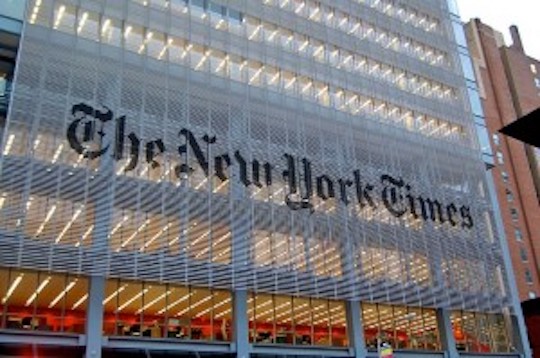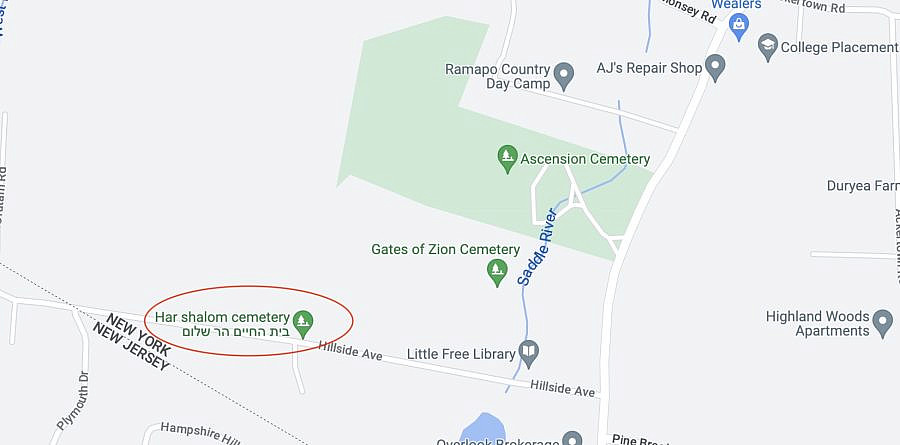
In the Middle Ages, Jews were accused of poisoning wells and starting plagues, including the Black Death. In present-day Rockland County, N.Y., and across state lines in New Jersey, the Orthodox Jewish community is being accused of something similar.
A May 11 New York Times article, titled, “A Cemetery or an ‘Environmental Train Wreck’? Burial Site Fuels Debate,” centers on a Jewish cemetery and mikvah (Jewish ritual bath), which, according to a neighbor quoted in the article, represent “an environmental train wreck in slow motion.”
The complaints also appear to center on Jewish burial practice: “no embalming fluids are used; bodies are placed in simple wooden caskets; and the graves are not lined with concrete vaults or lids, facilitating decomposition and the body’s return to the earth,” the Times reported.
According to haredi education and culture specialist Moshe Krakowski, director of doctoral studies at Yeshiva University’s Azrieli Graduate School of Jewish Education and Administration, “the ‘concern’ is literally that they think for some unexplained reason that the cemetery will poison the wells. I’m not making this up.”
When Krakowski researched the situation, he learned that the apparent controversy “was cooked up by Rise Up Ocean County, a borderline neo-Nazi hate group that’s been banned several times from Facebook.”
New Jersey Gov. Phil Murphy, a Democrat, denounced the group in 2020 for “racist and antisemitic statements,” including “an explicit goal of preventing Orthodox Jews from moving to Ocean County.”
Three of the sources quoted in the Times article, Krakowski found, appear often on the Rise Up Ocean County website: Heather Federico, Danielle Meehan and Gordon Wren, and the Times article echoed many of the elements of a 2022 post on the group’s blog.
The sources have ties to a group called Citizens United to Protect Our Neighborhoods.
“We first met Heather Federico almost two years ago and since then have admired her tenacity,” a post on the Rise Up Ocean County blog states. The Times offers just a description of Federico being a “member of a community group opposed to both ventures,” the mikvah and the cemetery.
A 2020 federal lawsuit filed against Jackson Township, N.J., which cites “widespread animus toward the Orthodox community,” calls Citizens United to Protect Our Neighborhoods “a group purportedly against development and espousing antisemitic views.”
“In August 2019, three Township officials, ZBA chairman Sheldon Hofstein, ZBA member Joseph Sullivan, and Planning Board member Richard Egan resigned after reports and videos surfaced documenting their attendance at and participation in a CUPON meeting,” the Justice Department noted in the lawsuit. (ZBA refers to Jackson’s Zoning Board of Appeals.)
“These are hate groups,” Krakowski told JMS. “There is no real environmental problem here of any kind—in fact, there are several other local cemeteries immediately adjacent to the proposed cemetery that these ‘critics’ have no problem with. What’s really going on here? The problem isn’t the environment. It’s the Jews.”
A bridge, and road, to nowhere
Tzvi Waldman, a community activist who lives down the road from the new mikvah and the cemetery, told JNS that Rockland County only has one public mikvah for use during the week and several “satellite” ones for use on Shabbat. Due to public demand, particularly as the Orthodox community in the area grew, another was needed.

Behind Har Shalom Cemetery, located on Hillside Avenue in Airmont, N.Y., are Gates of Zion and Ascension Cemeteries—the ones that Krakowski noted aren’t being said to poison wells—and behind that is a “huge, empty forestry area,” according to Waldman.
A road that connects that area to other parts of Rockland County was closed and remains closed to traffic. “It cuts off access to the mikvah from a huge, huge area,” Waldman told JNS. “A literally eight-minute drive would turn into a 20-minute drive. I’ve been actively trying to get them to do something about it.”
He’s been talking to county and other local officials and is optimistic.
“This is an issue that could be worked out if various government officials come together and have an honest conversion,” Waldman told JNS. “I’m really hopeful that conversation can happen so it can be resolved.”
He thinks that certain people in the neighborhood were involved in a bridge, on the same road, being closed and in trying to block the mikvah and Jewish cemetery.
“They’re using bureaucracy to delay the opening,” he said, of the closed road. “It doesn’t matter to me what the reason was for it to be closed. At this point, it needs to be resolved,” he said. “It’s something that is essential for us, and the road gets closed. We have to wonder why.”
Asked about the Times’ reporting on Jews in the context of poisoning wells, Waldman said that “history repeats itself. It’s shocking today, where we have access to so much information to research. People fall into the same traps and the same nonsense.”
‘Words have consequences’
Krakowski sees the Times story as part of a broader pattern of reporting that is critical of Orthodox Jews, particularly its reporting on Chassidic education.
“This isn’t the first time the Times has demonstrated extreme anti-Orthodox bigotry and bias,” he told JNS.
Last month, the Daily Signal wrote that the Times published “inflammatory yet poorly sourced accusations against a vulnerable minority group” at “a time when violence against New York City’s Orthodox Jews has reached record highs.”
That, per the Daily Signal, should be grounds for the reporter’s “immediate expulsion from the Times, not consideration for a Pulitzer.”
Waldman told JNS that the Times “gives cover to other people to repeat stuff that is blatantly antisemitic, nonsensical and not fact-based.”
When Jew-hatred appears in the newspaper, it could give rise to people attacking Jews, he said. “Words have consequences. It’s something that our leaders have to realize.” JNS
Source: Matzav